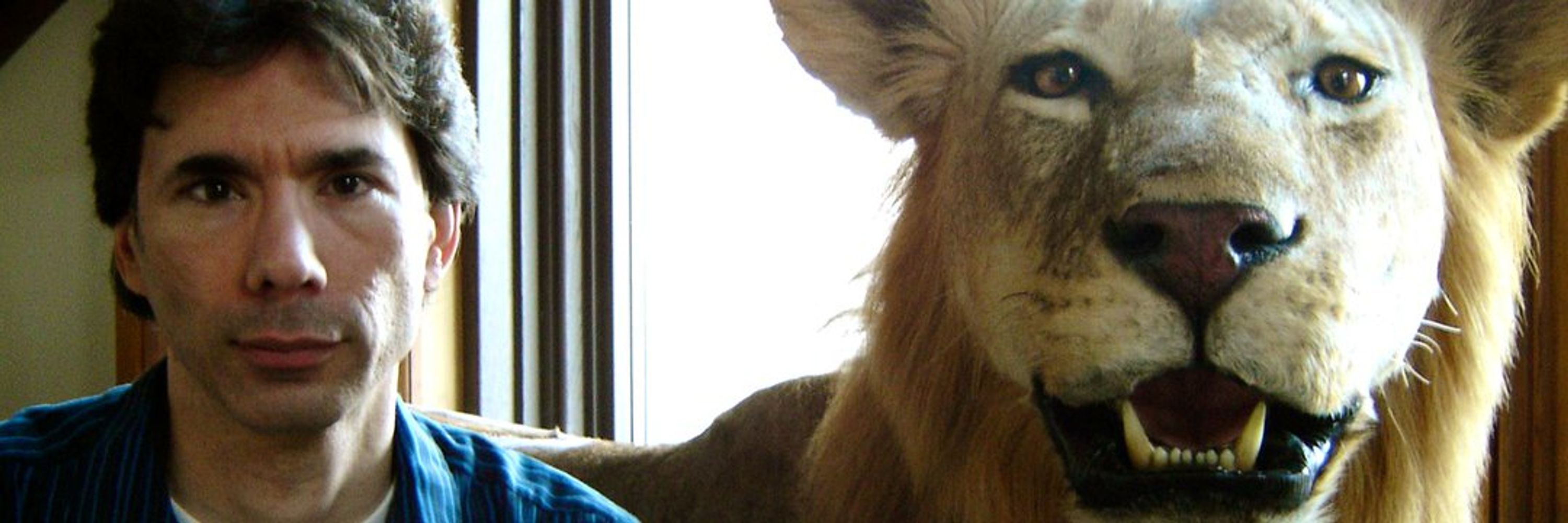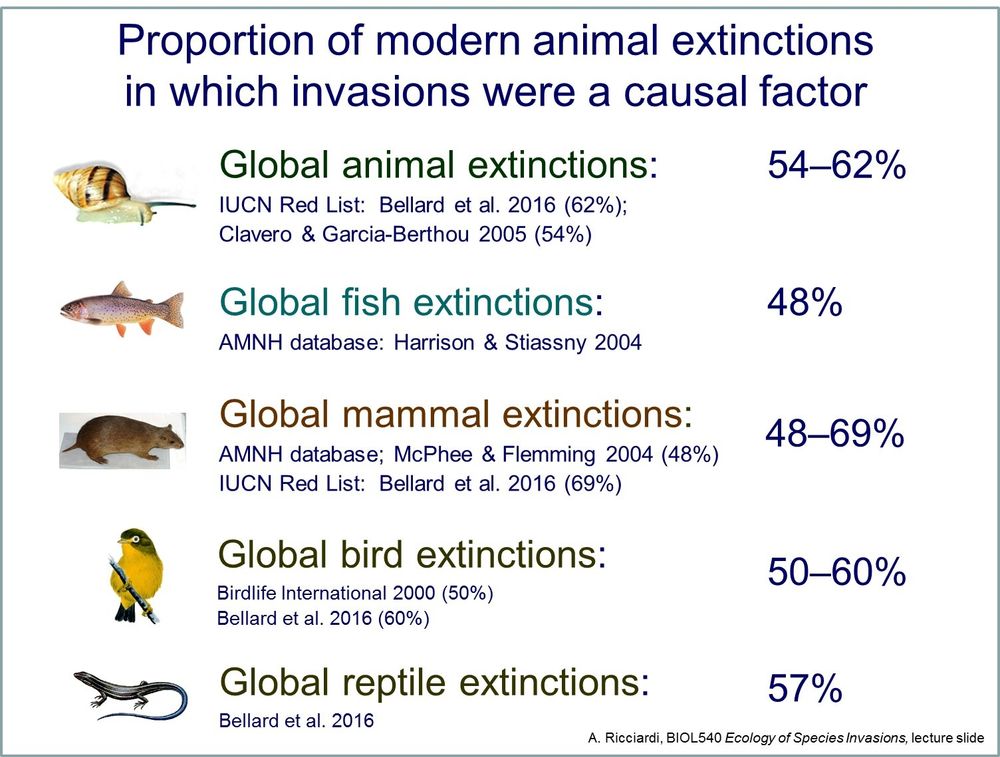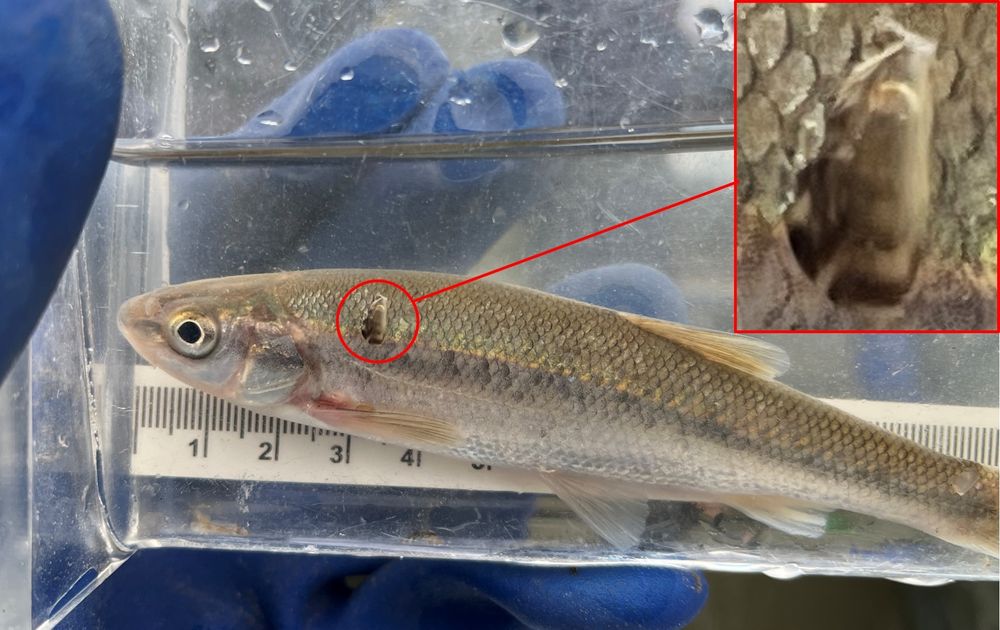
Anthony Ricciardi
@ecoinvasions.bsky.social
Ecologist (invasive species, freshwater biodiversity, bioinvasions, aquatic ecosystems) | Professor of Biology, McGill University | Director of the Bieler School of Environment | My lab account: @ricciardilab.bsky.social
As a grad student, I gave a talk at the 1994 International Zebra Mussel Conference (now called ICAIS) about a probable future N.Am. invasion by Limnoperna fortunei, the golden mussel. And in 1998 I wrote this warning:
redpath-staff.mcgill.ca/ricciardi/Ri...
The mussel was found in California in 2024
redpath-staff.mcgill.ca/ricciardi/Ri...
The mussel was found in California in 2024

November 6, 2025 at 1:47 AM
As a grad student, I gave a talk at the 1994 International Zebra Mussel Conference (now called ICAIS) about a probable future N.Am. invasion by Limnoperna fortunei, the golden mussel. And in 1998 I wrote this warning:
redpath-staff.mcgill.ca/ricciardi/Ri...
The mussel was found in California in 2024
redpath-staff.mcgill.ca/ricciardi/Ri...
The mussel was found in California in 2024
The 2023 IPBES report on invasive alien species highlighted a global threat requiring multidisciplinary attention. In this 2021 paper, our team outlined four priority areas to advance invasion science in an era of rapid environmental change:
cdnsciencepub.com/doi/full/10....
cdnsciencepub.com/doi/full/10....

November 6, 2025 at 12:42 AM
The 2023 IPBES report on invasive alien species highlighted a global threat requiring multidisciplinary attention. In this 2021 paper, our team outlined four priority areas to advance invasion science in an era of rapid environmental change:
cdnsciencepub.com/doi/full/10....
cdnsciencepub.com/doi/full/10....
A comprehensive global assessment of the status & trends of alien species for major taxonomic groups. This is an outstanding product of the 2023 IPBES assessment on invasive species.
onlinelibrary.wiley.com/doi/10.1111/...
onlinelibrary.wiley.com/doi/10.1111/...


November 5, 2025 at 10:55 PM
A comprehensive global assessment of the status & trends of alien species for major taxonomic groups. This is an outstanding product of the 2023 IPBES assessment on invasive species.
onlinelibrary.wiley.com/doi/10.1111/...
onlinelibrary.wiley.com/doi/10.1111/...
3/ We've learned much about the impacts of invasion over the past 50 yrs. But the context-dependency & complexity of impacts makes them inherently difficult to predict. In my judgement, we lack adequate risk assessment methods to depend heavily on species introductions to advance conservation goals.

November 1, 2025 at 5:38 AM
3/ We've learned much about the impacts of invasion over the past 50 yrs. But the context-dependency & complexity of impacts makes them inherently difficult to predict. In my judgement, we lack adequate risk assessment methods to depend heavily on species introductions to advance conservation goals.
A new global meta-analysis suggests that reductions in native plant diversity & increases in greenhouse gas emissions are common impacts of terrestrial invasions. Longer residence times intensified negative effects of invasive plants on native diversity. #bioinvasions
www.science.org/doi/10.1126/...
www.science.org/doi/10.1126/...


October 24, 2025 at 5:04 PM
A new global meta-analysis suggests that reductions in native plant diversity & increases in greenhouse gas emissions are common impacts of terrestrial invasions. Longer residence times intensified negative effects of invasive plants on native diversity. #bioinvasions
www.science.org/doi/10.1126/...
www.science.org/doi/10.1126/...
I was in that area, only four days ago, on some academic business. Had time to rent a bike and ride along the edge of Stanley Park, on Friday. Somehow managed to avoid being splashed by waves that frequently breached the sea wall.

October 21, 2025 at 6:37 AM
I was in that area, only four days ago, on some academic business. Had time to rent a bike and ride along the edge of Stanley Park, on Friday. Somehow managed to avoid being splashed by waves that frequently breached the sea wall.
A new species of trout, Salmo epimolos, coexists with & is morphologically distinct from introduced brown trout S. trutta in a Pennsylania creek. It likely reflects reproductive isolation & divergence from a founder population of brown trout established since 1886 www.tandfonline.com/doi/full/10....

October 12, 2025 at 11:27 PM
A new species of trout, Salmo epimolos, coexists with & is morphologically distinct from introduced brown trout S. trutta in a Pennsylania creek. It likely reflects reproductive isolation & divergence from a founder population of brown trout established since 1886 www.tandfonline.com/doi/full/10....
6/ Although some native species can also become superabundant & damaging (but only when triggered by disturbance), non-native species are far more likely to be implicated as a cause of global extinction:
t.co/9NUoV81a54
t.co/9NUoV81a54

October 11, 2025 at 7:49 AM
6/ Although some native species can also become superabundant & damaging (but only when triggered by disturbance), non-native species are far more likely to be implicated as a cause of global extinction:
t.co/9NUoV81a54
t.co/9NUoV81a54
3/ Evidence from various studies (some shown below) & taxonomic groups have implicated invasions as the sole or contributing cause of a large proportion of global animal extinctions.
An additional line of evidence comes from recoveries of native species following invasive species eradications.
An additional line of evidence comes from recoveries of native species following invasive species eradications.

October 11, 2025 at 7:44 AM
3/ Evidence from various studies (some shown below) & taxonomic groups have implicated invasions as the sole or contributing cause of a large proportion of global animal extinctions.
An additional line of evidence comes from recoveries of native species following invasive species eradications.
An additional line of evidence comes from recoveries of native species following invasive species eradications.
The reviewer crisis: data from the journal Biological Invasions:
"Reviewer acceptance rates dropped steadily over the past two decades. Early-career researchers had the highest acceptance rates, while senior scholars were least likely to accept review invitations."
link.springer.com/article/10.1...
"Reviewer acceptance rates dropped steadily over the past two decades. Early-career researchers had the highest acceptance rates, while senior scholars were least likely to accept review invitations."
link.springer.com/article/10.1...

October 9, 2025 at 7:32 PM
The reviewer crisis: data from the journal Biological Invasions:
"Reviewer acceptance rates dropped steadily over the past two decades. Early-career researchers had the highest acceptance rates, while senior scholars were least likely to accept review invitations."
link.springer.com/article/10.1...
"Reviewer acceptance rates dropped steadily over the past two decades. Early-career researchers had the highest acceptance rates, while senior scholars were least likely to accept review invitations."
link.springer.com/article/10.1...
"I choose to listen to the river for a while, thinking river thoughts, before joining the night and the stars."
- Edward Abbey ('Desert Solitaire', 1968).
#WorldRiversDay #StLawrenceRiver
- Edward Abbey ('Desert Solitaire', 1968).
#WorldRiversDay #StLawrenceRiver

September 28, 2025 at 3:40 PM
"I choose to listen to the river for a while, thinking river thoughts, before joining the night and the stars."
- Edward Abbey ('Desert Solitaire', 1968).
#WorldRiversDay #StLawrenceRiver
- Edward Abbey ('Desert Solitaire', 1968).
#WorldRiversDay #StLawrenceRiver
New paper from our lab: The use of #microplastics as case-building material by larval caddisflies facilitates the transfer of plastic (& potentially its associated contaminants) to predatory fish.


September 26, 2025 at 3:42 PM
New paper from our lab: The use of #microplastics as case-building material by larval caddisflies facilitates the transfer of plastic (& potentially its associated contaminants) to predatory fish.
There is reason to be concerned. Genetic swapping between flu viruses has likely occurred in farmed pigs, and led to reassortment that created novel avian/swine flus.
The mixing vessel concept is important for understanding the emergence of invasive zoonotic pathogens from farming practices.
The mixing vessel concept is important for understanding the emergence of invasive zoonotic pathogens from farming practices.

September 26, 2025 at 3:20 PM
There is reason to be concerned. Genetic swapping between flu viruses has likely occurred in farmed pigs, and led to reassortment that created novel avian/swine flus.
The mixing vessel concept is important for understanding the emergence of invasive zoonotic pathogens from farming practices.
The mixing vessel concept is important for understanding the emergence of invasive zoonotic pathogens from farming practices.
There are times when this feels like an appropriate response...

September 20, 2025 at 7:11 PM
There are times when this feels like an appropriate response...
"...[Animal populations] form complex capillaries through which flow streams of matter and energy, subject to laws that are still almost unformulated in physico-chemical terms." [2/2]

September 16, 2025 at 4:16 AM
"...[Animal populations] form complex capillaries through which flow streams of matter and energy, subject to laws that are still almost unformulated in physico-chemical terms." [2/2]
The great British ecologist Charles Elton wrote in a gov't report in 1937:
"The earth is a unique natural park of life, whirling through an otherwise lifeless space. In this natural park are over a million forms of life, evolved into an unstable and highly complex network of communities." [1/2🧵]
"The earth is a unique natural park of life, whirling through an otherwise lifeless space. In this natural park are over a million forms of life, evolved into an unstable and highly complex network of communities." [1/2🧵]

September 16, 2025 at 4:15 AM
The great British ecologist Charles Elton wrote in a gov't report in 1937:
"The earth is a unique natural park of life, whirling through an otherwise lifeless space. In this natural park are over a million forms of life, evolved into an unstable and highly complex network of communities." [1/2🧵]
"The earth is a unique natural park of life, whirling through an otherwise lifeless space. In this natural park are over a million forms of life, evolved into an unstable and highly complex network of communities." [1/2🧵]
A fine tradition that I wish we had at McGill. This would be the book I would choose:

September 16, 2025 at 4:12 AM
A fine tradition that I wish we had at McGill. This would be the book I would choose:
How can interactions among non-native species raise the invasion rate of an ecosystem? What affect could more invaders have on the frequency of synergistic impacts?
Consider an alternative to the classical biotic resistance hypothesis: invasional meltdown
redpath-staff.mcgill.ca/ricciardi/Ri...
Consider an alternative to the classical biotic resistance hypothesis: invasional meltdown
redpath-staff.mcgill.ca/ricciardi/Ri...

September 13, 2025 at 2:09 AM
How can interactions among non-native species raise the invasion rate of an ecosystem? What affect could more invaders have on the frequency of synergistic impacts?
Consider an alternative to the classical biotic resistance hypothesis: invasional meltdown
redpath-staff.mcgill.ca/ricciardi/Ri...
Consider an alternative to the classical biotic resistance hypothesis: invasional meltdown
redpath-staff.mcgill.ca/ricciardi/Ri...
I have experience with 15 species of bryozoans including P. magnifica, which is only one that makes massive gelatinous supercolonies (see image below).
The individuals of the unknown "colony" in the OP post are tube-like & don't resemble a bryozoan. I showed it to an expert (Tim Wood), who concurs.
The individuals of the unknown "colony" in the OP post are tube-like & don't resemble a bryozoan. I showed it to an expert (Tim Wood), who concurs.

August 27, 2025 at 5:07 PM
I have experience with 15 species of bryozoans including P. magnifica, which is only one that makes massive gelatinous supercolonies (see image below).
The individuals of the unknown "colony" in the OP post are tube-like & don't resemble a bryozoan. I showed it to an expert (Tim Wood), who concurs.
The individuals of the unknown "colony" in the OP post are tube-like & don't resemble a bryozoan. I showed it to an expert (Tim Wood), who concurs.
Before COVID, we had pandemics in 2003 (SARS) & 2012 (MERS) of coronaviruses originating from zoonotic spillover. By 2015 we knew other SARS-like viruses in Chinese bats could replicate in human lung tissue. We don't need lab leak conspiracies to explain zoonotic diseases like COVID, avian flu, etc.

August 23, 2025 at 7:42 PM
Before COVID, we had pandemics in 2003 (SARS) & 2012 (MERS) of coronaviruses originating from zoonotic spillover. By 2015 we knew other SARS-like viruses in Chinese bats could replicate in human lung tissue. We don't need lab leak conspiracies to explain zoonotic diseases like COVID, avian flu, etc.
"Post a non-religious photo you think of as holy."

August 20, 2025 at 10:24 PM
"Post a non-religious photo you think of as holy."
A journalist with a bachelor's degree in economics believing they should peer review papers submitted by experts (e.g. engineers, chemists, molecular biologists, etc) to scientific journals...

August 18, 2025 at 5:39 PM
A journalist with a bachelor's degree in economics believing they should peer review papers submitted by experts (e.g. engineers, chemists, molecular biologists, etc) to scientific journals...
2/ We found a juvenile zebra mussel byssally attached to a fish (lake chub) collected in a lake that was invaded a few years earlier.
This novel phoretic interaction could facilitate within-basin spread of zebra mussels via fish migration and their overland transport by anglers moving baitfish.
This novel phoretic interaction could facilitate within-basin spread of zebra mussels via fish migration and their overland transport by anglers moving baitfish.


August 15, 2025 at 3:05 AM
2/ We found a juvenile zebra mussel byssally attached to a fish (lake chub) collected in a lake that was invaded a few years earlier.
This novel phoretic interaction could facilitate within-basin spread of zebra mussels via fish migration and their overland transport by anglers moving baitfish.
This novel phoretic interaction could facilitate within-basin spread of zebra mussels via fish migration and their overland transport by anglers moving baitfish.
1/ Darwin was fascinated by animal-assisted dispersal of invertebrates. Since his time, there have been numerous documented examples of the phenomenon. But the movement of (nonlarval) bivalves on freshwater fish was never observed in the field until our study: redpath-staff.mcgill.ca/ricciardi/Ri...

August 15, 2025 at 3:00 AM
1/ Darwin was fascinated by animal-assisted dispersal of invertebrates. Since his time, there have been numerous documented examples of the phenomenon. But the movement of (nonlarval) bivalves on freshwater fish was never observed in the field until our study: redpath-staff.mcgill.ca/ricciardi/Ri...
2/ Beaver ponds absorb more heat than snow & icy soil, thus accelerating the loss of permafrost (and the release of greenhouse gases trapped within the soil).
These landscape changes can be observed from space.
These landscape changes can be observed from space.

August 15, 2025 at 2:50 AM
2/ Beaver ponds absorb more heat than snow & icy soil, thus accelerating the loss of permafrost (and the release of greenhouse gases trapped within the soil).
These landscape changes can be observed from space.
These landscape changes can be observed from space.

